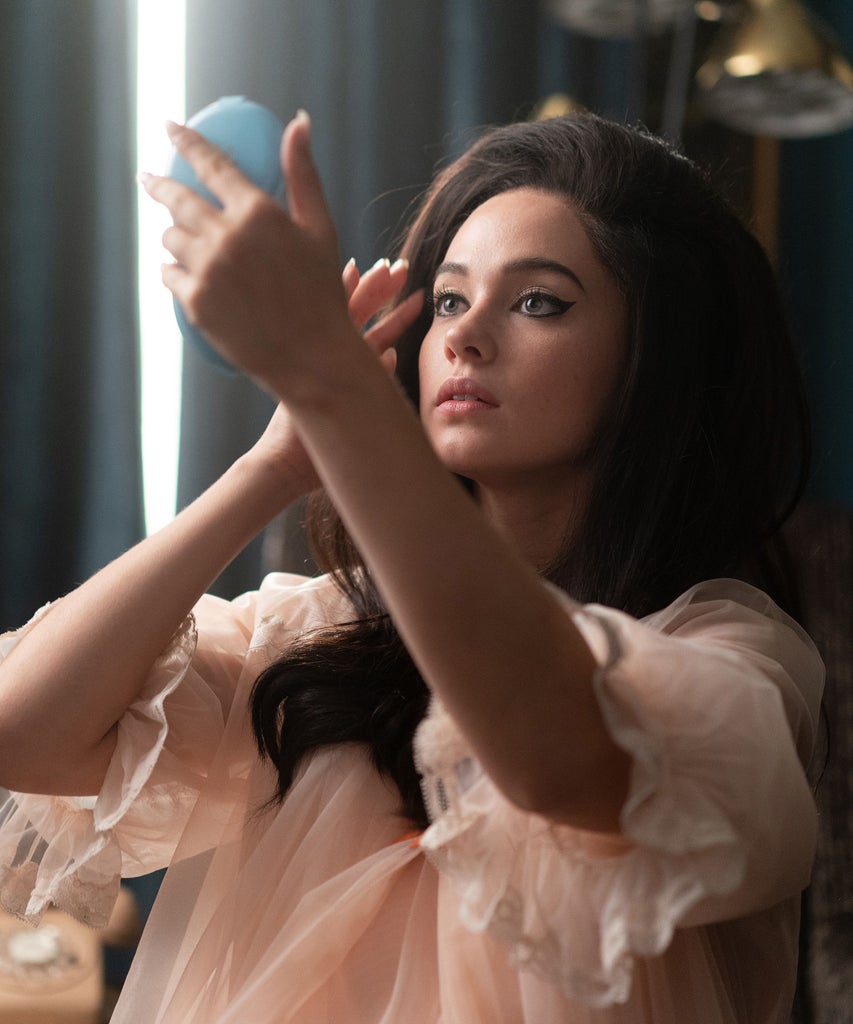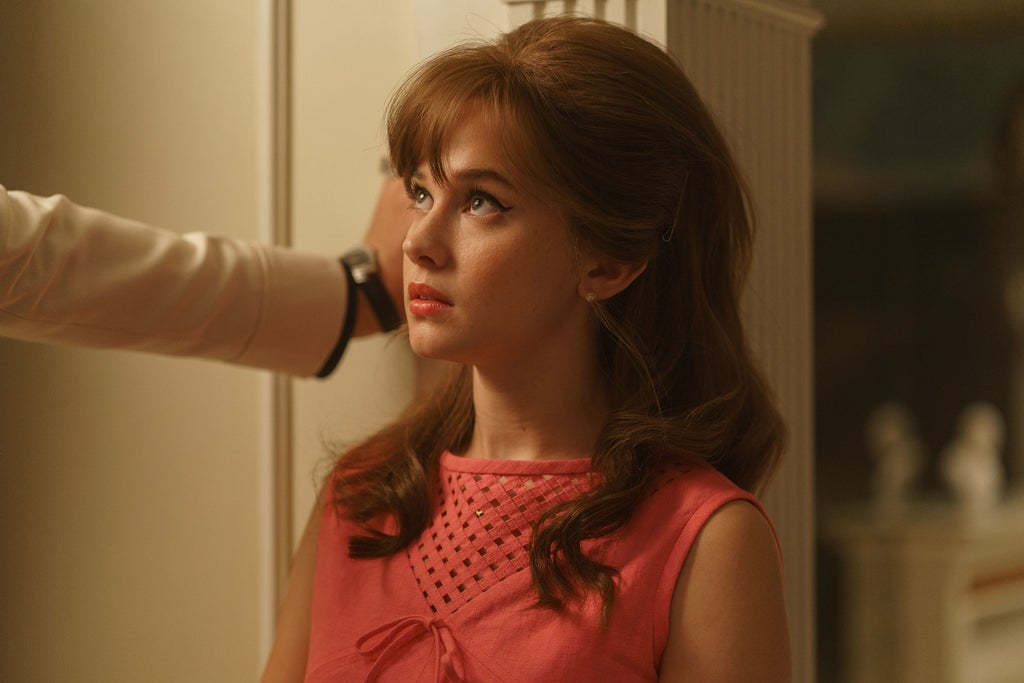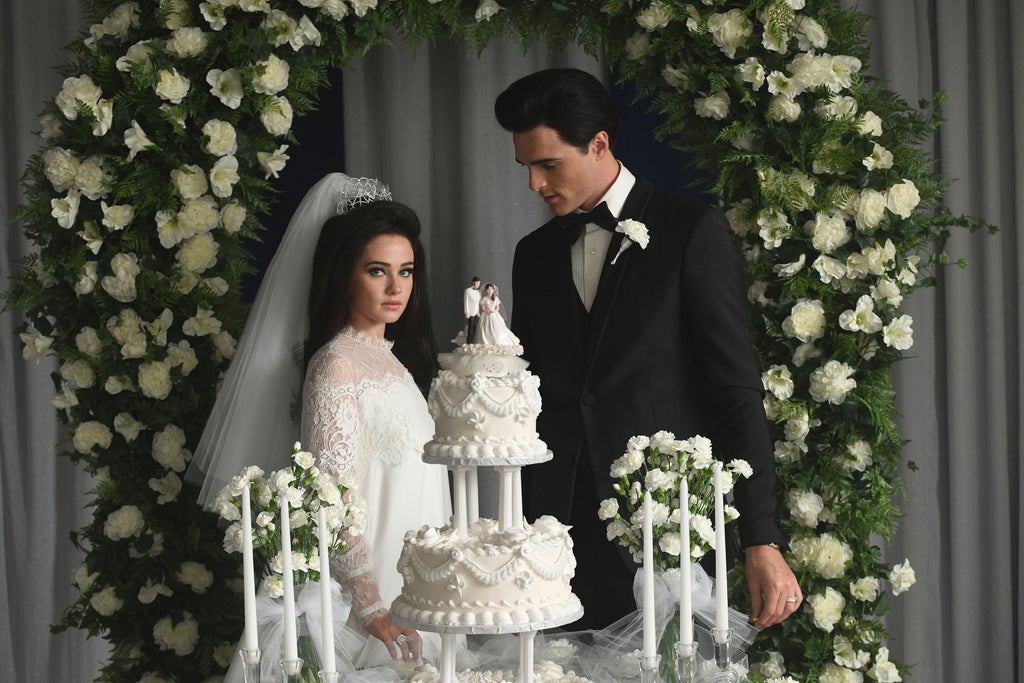
Spoilers ahead. “Behind every successful man, there stands a woman,” is the rhetoric shared in most biopics about famous men. From The Theory Of Everything to The King’s Speech and First Man, the sentiment remains the same; it may be tasking at times, but it is a privilege to be in the orbit of a powerful man. Finally, it seems like this lens has shifted with the release of Sofia Coppola’s Priscilla, a film that delves into the ugly underbelly of being married to the ‘King of Rock and Roll’ and examines how celebrity grooming happens in plain sight.
Inspired by Priscilla Presley’s own memoir Elvis and Me, the film forgoes the flashiness of Baz Luhrmann’s Oscar-nominated Elvis, instead presenting a subdued story of Priscilla’s abusive relationship with the famed musician. Told entirely from her perspective, Priscilla enters into the soft, daydream-like world of a teenage girl, where a 14-year-old Priscilla is whiling her days away on her father’s army base in 1950s Germany.
As she swings her legs on a diner stool sipping a milkshake, she’s approached by a married officer who wants to know if she is a fan of Elvis Presley. The man goes on to explain that the singer is stationed nearby and would love to meet more Americans abroad, even offering to persuade her parents to let her attend an upcoming party at Elvis’ house.
While we can see how the age gap makes the interaction objectively toe-curling, Coppola commits to the subjective point of view, showing it as a true fandom fantasy come to life. Priscilla is embarrassed and excited, dizzy at the idea of breathing Elvis’ rarified air and being the envy of every other girl at school. As she painstakingly picks out the perfect party dress, we understand the weight of this invitation. This is the promise of a glamorous adult life, one that replaces math tests with poker games and parental control with romantic escapades.
As she arrives at the bustling party with her designated chaperone in tow, we view Elvis through crushing eyes, all charm, cigar smoke and perfectly placed hair gel. In a cautious conversation, Priscilla admits that she’s only a freshman in high school, provoking a laugh from Elvis who calls her ‘just a baby’. It’s a familiar and ick-inducing scene, a girl desperate to be seen as a woman, not knowing that her youth is exactly what makes her desirable to a room full of adult men.
Like something straight from the seduction playbook, a 24-year-old Elvis invites her to go somewhere “quiet” and kisses her in his bedroom after little conversation. Eventually, after a lengthy bout of long distance love letters, Elvis convinces Priscilla’s parents to let her move with him back to the States. It’s an unbelievable sight, seeing a grown man using his prestige to persuade a teenager’s parents to let her move across the world. He says he shares their view that she should be enrolled in a good Catholic school, and everyone seems to ignore the fact that he also wants said school-age girl to share his bed.

It’s an example of just how insidious grooming can be, with the perpetrator convincing everyone involved that their actions are being made out of love rather than a desire for control. For 17-year-old Priscilla, Graceland promises her the adult life she craves, free to finally become a woman. But to her confusion, Elvis is more interested in her naivety, wanting to preserve her purity and virginity like a precious china doll wrapped up in his silk sheers (of course, he says they can still “do other things”).
It’s one of the many examples of Elvis’ jurisdiction at Graceland, a place where he dictates what colours she looks best in, what dresses she can buy, how she should dye her hair and how much makeup to wear. Like Rapunzel in a rhinestone-covered castle, she’s not allowed to get a job or have girlfriends her own age, explained as a sacrifice for the honour of being Elvis’s girl.
The truth, of course, is that keeping her disconnected from teenage circles keeps her isolated and believing that the treatment she’s receiving is okay. It’s a hallmark of abusive age-gap relationships, where the older party convinces the younger that their new lifestyle is a symptom of maturity rather than clear coercion. It’s an alarmingly realistic unfolding of events, one made worse by the knowledge that brains don’t stop fully developing until the age of 25.
For a teenage Priscilla, this behaviour is her only understanding of how relationships work, making Elvis’ control feel like commitment and protection. The simplistic teenage reasoning only exacerbates the unsettling feeling for an adult audience, seeing how through child-like eyes a man with so much influence could be mistaken for a good person.

While Elvis is of course still a lead character in Priscilla, the film chooses to focus wholly on Elvis the husband, rather than the musician. This is perhaps shown best by the complete lack of the musician’s songs in the film, only giving the audience one stage shot of him as part of a wider montage. By refusing to show the reason he was so widely adored, Coppola demands we pay attention to his actions, highlighting how often celebrities use showmanship as a distraction tactic and how performance often protects them from public disdain.
At the helm though, is Priscilla, with her viewpoint exposing the hard truths behind one of the world’s most famous marriages. Priscilla is a reminder that this type of behaviour has a long history in celebrity circles. While society may have only started paying attention since the #MeToo movement, Priscilla shows how Hollywood has always made excuses for predatory actions — or worse, thought there was nothing wrong with it.
While some may use the era’s gender dynamics as a reasoning for the couple’s decade-long age gap, Priscilla’s biggest success is its unapologetic stance on the grooming the relationship was built on. Watching a school girl be explanted from her family home under the guise of a consensual relationship may be shocking to see in 2023, but the fact that the couple didn’t officially marry in the public eye until Priscilla turned 21 suggests that even to a 1950s society, her age was a point of contention.
Led with conviction by star Cailee Spaney, Priscilla ultimately reframes the famous love story as a hero’s journey, this time with a woman’s voice front and centre. While it may begin in the rose-tinted glow of youth, the narrative shows the poignancy of growing older and how true maturity eventually allows Priscilla to advocate for herself and her daughter. It’s a moving testament to the forced adultification of young girls and stands as a powerful coming-of-age story about a woman who was so often relegated to a fashionable footnote.
As the messiah of teenage-girl narratives, Coppola, who also directed The Virgin Suicides and The Bling Ring, ultimately manages to tell a story that firmly puts the power in the victim’s hands, while not shying away from the complicated messy feelings that come with falling for someone who hurts you. Ending with her jet black beehive replaced by natural messy waves, Priscilla is a much-needed film about reclaiming agency and what better way to tell that story than de-centring the man who took it from her and finally giving Priscilla The Woman the spotlight she deserves.
Priscilla is in UK cinemas January 1st.
Like what you see? How about some more R29 goodness, right here?
Where To Stream Every Sofia Coppola Movie